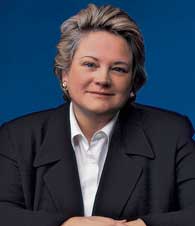|
Executive Interviews: Interview with Tamara J Erickson on Managing Troubled Times
March 2009
-
By Dr. Nagendra V Chowdary
You have observed (in “GiveMe the
Ball!” Is the Wrong Call, HBR,
December 2008) that, “Downturns are
no time to tighten control. They’re
opportunities to inspire your people
to become more spontaneous and
innovative. Pass the ball”, and
suggested that, when times are tough,
leaders should: ask great questions;
build trust across the organization,
and challenge the status quo. Can you
please elaborate on these three tasks
of the CEO?
During a downturn, a leader’s role is
to do three things:
|
|
- Ask great questions. Challenge the
organization to meet goals that are
intriguing, complex and important.
Don’t narrow the focus to the
mundane or over-specify the way
teams should approach their
challenges. Articulate a compelling
intent – something that, in the
language of complexity theory, will
serve as a “strange attractor” to rally.
- Build relationships and trust deep
in the organization. Don’t cut out
meetings, intensify the competition
among internal teams, or reduce
investments in learning. Increase
your firm’s “collaborative capacity” by
building relationships and
encouraging knowledge exchange.
- Challenge the status quo. Insure
that your team has regular on-going
exposure to disruptive insights
through diversity and external forays.
Don’t cut travel or fall back on the old
“tried and true” team. Bring in new
people and new ideas – and take
them seriously. Get outside your
business sphere. Encourage
brainstorming and the use of scenario
analysis. Don’t cut training – invest
in your people.
In a downturn, rather than trying to
tighten control and hunker down,
find ways to help your organization
become more spontaneous,
innovative and reflexive.
What are some of the key insights
from your research and consulting
work in building collaborative and
innovative organizations?
Think about innovations you’ve
benefited from in the past. Did you
know that ‘Post It Notes’ were
developed when one colleague’s
research failure – glue that didn’t
work well – solved another
colleague’s frustration with keeping
his page markers secure in his choir
book? Or that Nike running shoes
were developed jointly by a coach
with an in-depth understanding of
runners’ feet and a boot maker with
the skill to craft a new type of shoe?
In these examples, and many others
that I’ve studied over the years,
innovation occurred when two areas
of knowledge or insight came
together. The hallmark of effective
teamwork – and the heart of any great
leap forward – is, in some way, the
combination of two previously
unrelated ideas or capabilities. These
might be:
- An insight about a business need
and a new way to solve it
- Two technologies that have never
before been combined
- The skills of one colleague sparking
the creativity of another, or
- Any other merger of two
approaches or perspectives.
Occasionally disparate ideas come
together within an individual’s mind.
Butmore often these creative leaps are
sparked by two or more people
working together. If you think about
it, it’s easy to understand why that is:
each person on a team offers their
own unique competency,
perspectives, and experiences. When
these come together, the results can be
phenomenal. Now, here’s the paradox: diversity
stimulates innovation – but it also
makes operating as a team more
challenging. Having people on a team
who are “different” from one another
means the team’s more likely to come
up with new ideas, but it also means
the team will have a harder time
working collaboratively. Our research shows that teamwork is
highly dependent on the existence of
trust-based relationships. Therefore,
the second step in working
successfully within a
multigenerational teamis to invest the
time and effort required to get to know
your fellow team members as
individuals.
1.
Troubled Times Case Study
2. ICMR
Case Collection
3.
Case Study Volumes
|
